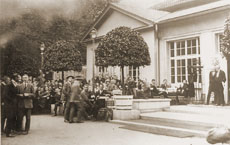


From the mid 1920s, the Hannover student body was becoming more and more radical, led by nationalistic ideology and culminating in the notorious “Lessing case”.
From 1908 the Jewish Privatdozent (private lecturer) for Philosophy, Theodor Lessing, held lectures in the Department of General Sciences. With the reform of higher education he became an associate professor without the status of a civil servant and received a lectureship for Philosophy and Natural Sciences.
His reporting on the Haarmann trial and his article on Hindenburg, in which he warned of the possible political consequences of Hindenburg being elected Chancellor of the Reich, led to a massive boycott of his lectures from 1925 onwards by students at the Institute of Technology, who mainly subscribed to right-wing conservative and nationalistic ideology. Due to public pressure, the Department of Education saw itself forced to intervene. Disciplinary measures were introduced against the students. On 18th June 1926 Lessing stopped lecturing and was given a permanent research contract on the philosophy of history and culture in lieu. When the National Socialists came to power, his research contract was withdrawn.
Theodor Lessing was assassinated in exile in Marienbad by Nazis on 31st August 1933.
In the student council elections at Hannover Institute of Technology in 1929/1930, with a turnout of 75%, the Korporation, or Fraternity, List received a majority of 88.9%. The Science List, representing students who were not members of a fraternity, received 5.4%. The National Socialist Students List received 5.8%. In 1930 the National Socialist Students received 11.8%. In winter semester 1932/1933 70 students at Hannover Institute of Technology were members of the Nazi Students Association, which corresponds to 3.7% of all students After the National Socialists came to power, almost half of the students joined the Nazi Students Association by July 1933.








